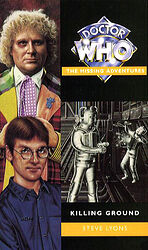
 |  |  |

 | Reviews for Killing Ground |
|
 |  |  |
There are 2 reviews so far. To add a review of your own for this item, visit the voting page.
 |  |  |

 | If only seasons 22/23 were this good! |
|
 |  |  |
| By: | PJ Johnson, Hoddesdon, United Kingdom |
|
| Date: | Tuesday 16 November 2004 |
|
| Rating: |   10 10 |
'Killing Ground' is a thoroughly gripping, moving, thrilling and at times disturbing book, instantly recognisable as Doctor Who but at the same time dealing with far more adult issues than the television series and indeed most Doctor Who books have ever done.
The story revolves around the Earth colony Agora (new companion Grant’s homeworld), which for the past fifteen years has been ruled by the Overseers, a violent, fascist police force commanded by the sadistic Madrox. The Overseers monitor the population of Agora whilst preparing five hundred prime specimens for conversion, to be delivered every three years to their masters - the Cybermen. In order to defend Agora from the invaders, a rebel group lead by the ambitious but arrogant Henneker create 'bronze knights' - human volunteers converted into cyborgs much like the Cybermen, exept supposedly with their minds left fully intact. Henneker is convinced his creations will defeat the Cybermen and free Agora, but will his 'solution' prove more dangerous than the invaders themselves?
Steve Lyons’ use of Cyber conversion as a key element in his story is an obvious nod to the 1968 TV story 'The Tomb of the Cybermen', considered by many fans to be an all-time classic story. The central theme of 'Killing Ground' questions how the human brain survives the conversion process, and to what extent the person's memories, beliefs and ideals remain intact. This idea is superbly handled and at times very thought-provoking, particularly when Lyons draws parallels between the actions of the tyrannical Cybermen and Agora's 'saviours' the Bronze Knights.
One of Killing Ground's strongest points is its wonderful characterisation - every character, from the excellently portrayed sixth Doctor to the most inconsequential guard, is handled with such care and attention to detail that a separate book could easily be written about each and every one of them. The sixth Doctor in particular is compelling, and I found myself wishing that Colin Baker's Doctor had been so well written for during his unfortunate two years on the show. The relationship between the Doctor and his new assistant Grant is also developed very well, as is Grant’s character and tragic background.
One example of Lyons’ extraordinary attention to detail that is particularly worthy of mention is his obvious reference to the 1975 TV story ‘Revenge of the Cybermen’, in which the Cyberleader is at one point seen strutting around with his hands on his hips – typically human behaviour. This has always been considered by eagled-eyed fans and critics as being an unfortunate lapse by the story’s director, but not only does Lyons describe his Cyberleader behaving in exactly the same manner, he also has the Doctor draw attention to it, mocking his enemy in an incredibly rewarding moment for die-hard fans.
Few books (and even fewer Doctor Who books) can match Killing Ground for its dark, gripping and thought-provoking plot, thrilling action sequences, heart-wrenching moments, truly likeable and sympathetic heroes, despicable villains and tragic antiheroes. This book has so much to offer both dedicated Doctor Who fans and newcomers alike, it really is a must-read – I intend to purchase another copy very soon as my existing copy is falling apart from being read cover to cover more times than I can remember!
| By: | David Layton, Los Angeles, United States |
|
| Date: | Sunday 5 July 2020 |
|
| Rating: |    7 7 |
With his second or third novel, Steve Lyons still has not quite found what works for him. "Killing Ground" stays pretty close to Eric Saward - style Doctor Who. It's limited to a few tight locations, and plotted around various battles with linking scenes mostly meant to get the reader to the next battle. The Doctor spends most of the novel chained up and out of action. The main idea is not fully dealt with. Doctor 6 has decided rather off-handedly to take his new companion Grant Markham, from Lyons' previous novel "Time of Your Life," to his home world, which Grant had left when he was a small child. Agora, it turns out, has been made into a Cyberman breeding ground, with the natives forced to reproduce to provide material for Cyber conversion. There's a ragtag and hopeless kind of resistance movement using stolen Cyber technology to create a fighting force they are calling Bronze Knights. Also, this particular period in Cyber history is the subject of investigation for a pair of time-travelling historians, the elder of whom secretly wants to become a Cyberman (or woman, as it were). In typical Saward fashion, the story is quite violent and bloody, with the heroes continuously trapped and about to be killed when some kind of miraculous thing manages to get them saved. The incidents become increasingly frequent until in the last 40 or so pages that is all that is happening. Some questions remain at the end, such as why The Doctor chose to take Grant to Agora. Grant keeps wondering, but no answer is given. At the end, it seems that Grant will continue travelling in the TARDIS, though this turns out to be the last novel with him in it. Lyons does a very good job of writing a Saward-style story, very much in the spirit of 1983-4 Doctor Who.


